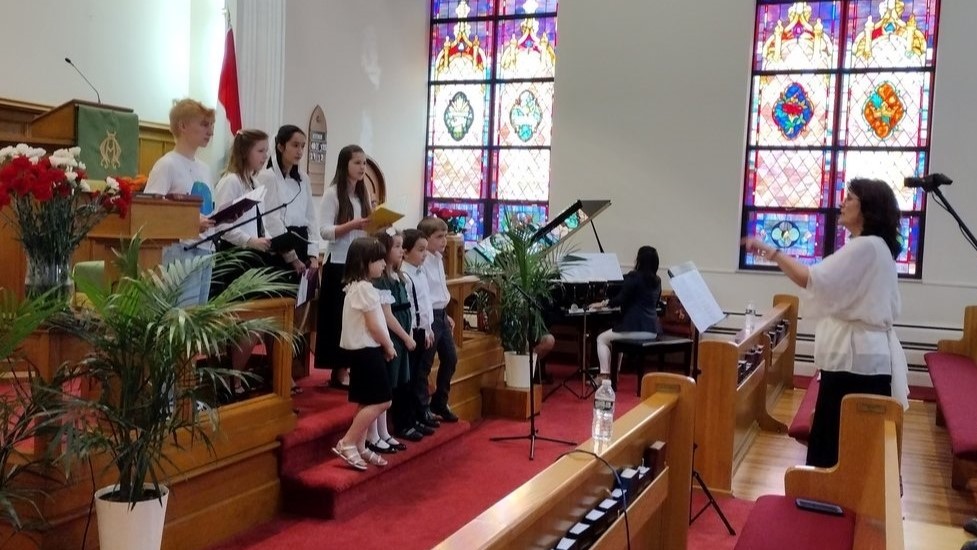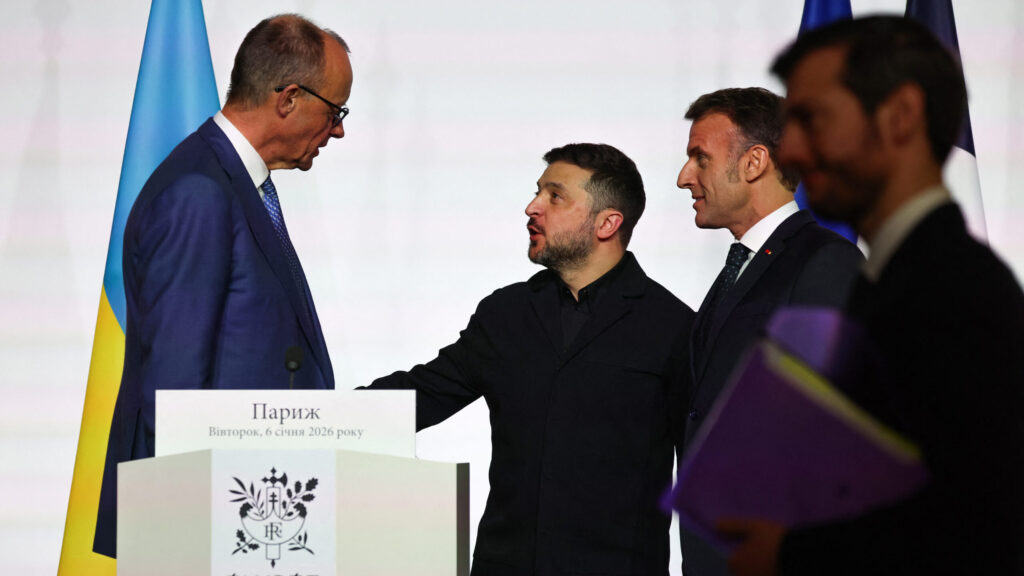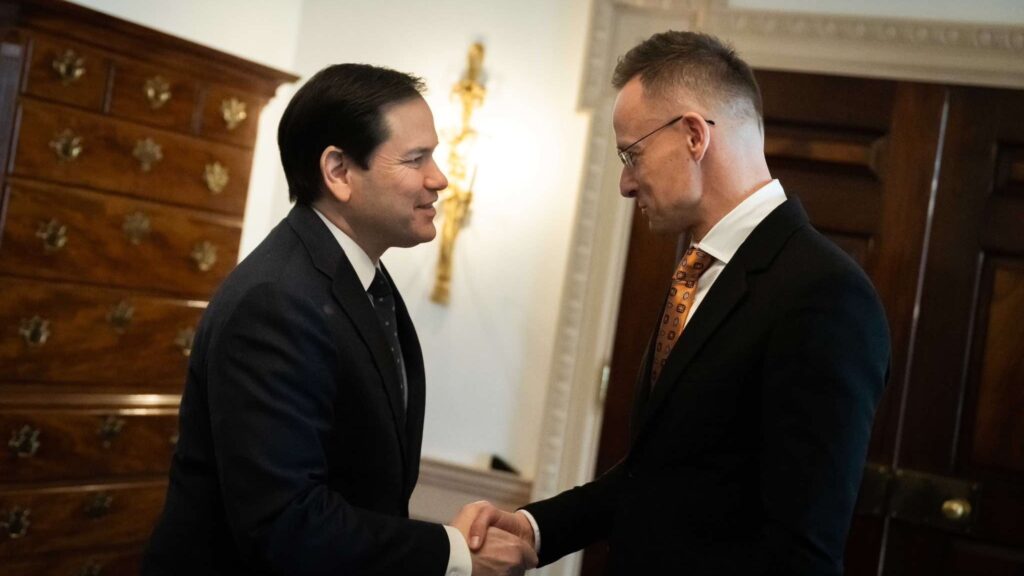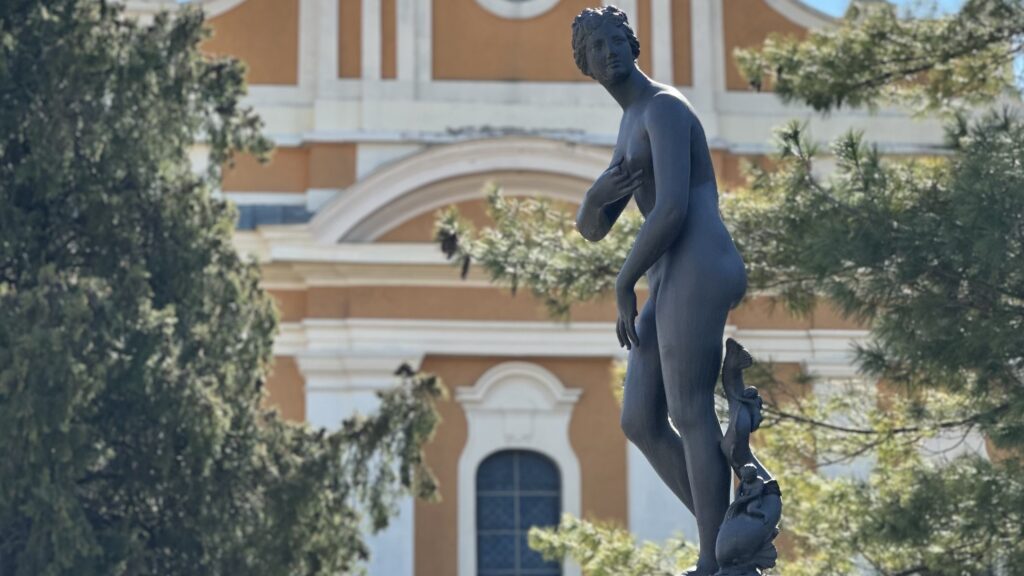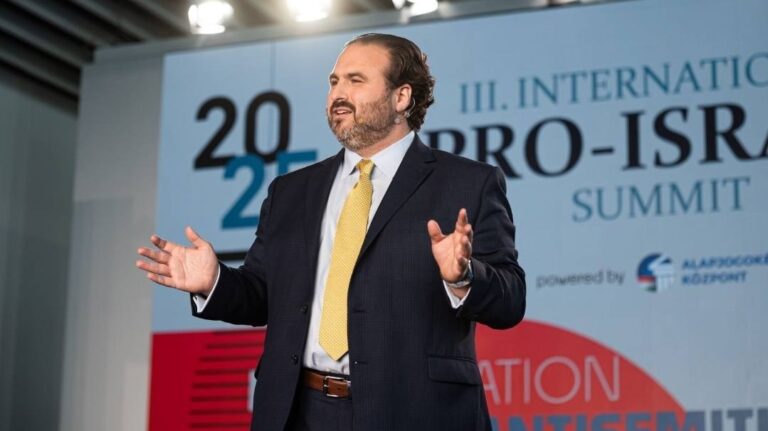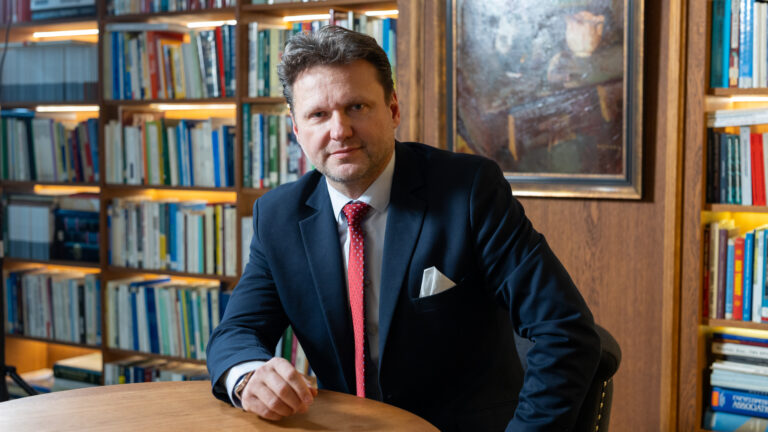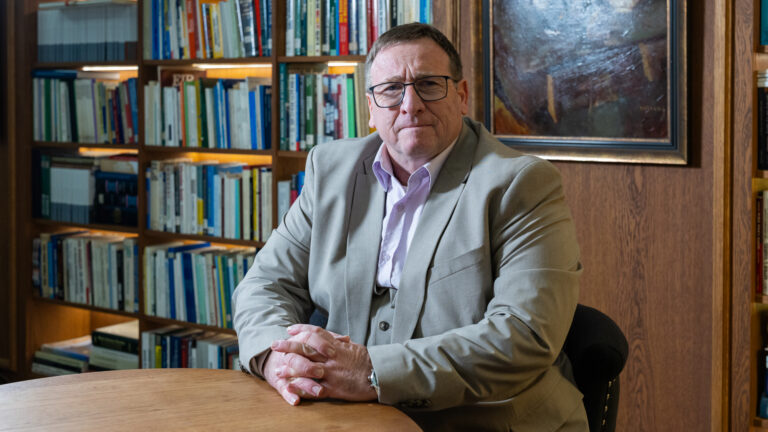This is an adapted version of the interview first published in Hungarian on reformatus.hu.
Reverend Zsolt Ötvös has been the pastor of the Magyar Reformed Church in New Brunswick, New Jersey for fifteen years. He previously served in Canada and then in Columbus, Ohio. In those Reformed churches where recent Hungarian immigrants and second-generation Hungarian communities can serve together, he could see God’s special blessing. During our conversation in the church at the time of the 2023 Hungarian Festival, the most well-known Hungarian event on the East Coast of North America, we could hear the merry noise of the fair and the stage performances in the yard. From time to time, children and parents preparing for the folk-dance performance stuck their heads into the room where we were talking, quite obviously feeling at home in the church.
***
The local Reformed Church has been actively participating in the organization and management of the annual Hungarian Festival since the beginnings. Moreover, it is one its the three main organizing and financing institutions, along with the local scouts and the Hungarian club, is that right?
Yes. The goal of the church in relation to the event is mostly charitable, since the revenues and donations from the sale of food prepared by our church members is utilized for community support. But participation in cultural programs is just as important to us: not only artists belonging to the congregation, such as the singer Ildikó Rozs, but also other musicians and folk-dance guests perform in our yard. In addition, Ágnes Oláh organizes an exhibition every year, this year about Hungarian bridges. The Magyar Reformed congregation is bilingual—not only here, but also in several other American cities. The reason is that many of the second or third generations only partially speak Hungarian or not at all, mixed marriages are common, and we also have followers of non-Hungarian origin who take their part in the preparations just as actively as the Hungarians.
You have made a surprising statement: the local community is lucky to be bilingual. Why?
Every Reformed community is a little different, but there are general themes, too. I served five years in a bilingual congregation in Columbus, Ohio, where I experienced that after the mining industry in southern Ohio diminished, many Hungarians previously living in the mining area moved to the city, where they worked in the local steel factory. However, when the steel industry declined, the descendants of those Hungarians dispersed. Although some new immigrants came to the Ohio State University as lecturers or students over the past few decades, the number of immigrants in the inner parts of the country decreased significantly. All kinds of Hungarians have shown up in that church: Hungarians several generations removed from their immigrant forebears, and also those with an expressly American background, typically connected to the church through mixed marriages, or simply by their faith and love of a smaller church’s spiritual atmosphere. If we had built only on the Hungarian speaking community, our congregation in Columbus would have ceased to exist a long time ago.
Is the situation similar in New Brunswick?
Yes. What is an advantage here is that the Hungarian and English-speaking groups of the congregation are of about equal size. Hungarians have been coming here continuously since the end of the 19th century, and their children graduated here, and many of them stayed here. Hungarian immigration decreased over the past thirty years, but it didn’t stop completely, younger people still came. Half of the congregation in New Brunswick today is made up of Hungarian immigrants, and young people come from the areas beyond the current borders of Hungary, i.e. typically from Transylvania and Transcarpathia. The members who come to the English service are made up of second- and third-generation Hungarians and many other ancestries. Our church’s stained glass windows were financed by their families, their children and grandchildren are here now, and they enthusiastically serve in the church or work in our fundraising programs.
The grandparents of our current chief elder, Paul Bodó, for instance, came from Hungary, and his wife comes from the Katkó family, they are originally from Felvidék (the former Upper Hungary, today part of Slovakia). Paul, and his sister Pam speak some Hungarian, but their families and relatives are all American and are committed members and proud of their Hungarian origin: they were baptized here, confirmed here, found their partners and married here and their parents were buried here—i.e. their lives effectively took place here. They also keep in touch with some family in Hungary and visit them regularly. Our dedicated secretary, Kathy Toth is of Irish ancestry, and her husband, Charles Toth, our treasurer of Hungarian descent, has been a committed member of the congregation. One of our members named Menhart knows that his ancestors’ name was Menyhért. He doesn’t speak Hungarian either, but he is very aware of his Hungarian roots and is proud of them. His wife is from an Italian background, yet, they come to almost every service, because she is also connected to the fellowship spiritually. Hungarians, compared to other nationalities in the U.S., are still a ‘newer’ immigrant community, who started immigrating less than 150 years ago. Hungarian immigrants, their descendants and our members from other ancestries take their connections to our church seriously; and although it’s true throughout America that the (grand)children of many 56ers don’t speak Hungarian anymore, in New Brunswick most second- or even third-generation Hungarians speak the language quite well, some of them even excellently.
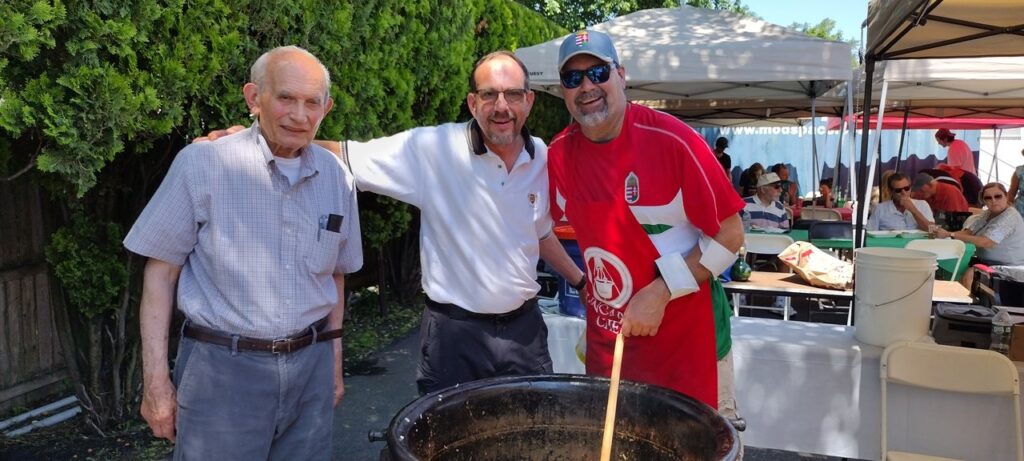
Moreover, people with no Hungarian roots or connections also come to our church: for example, an Italian Catholic woman attended the funeral of her Hungarian friend’s mother, after which she asked me to bury her mother, and then she started visiting us regularly. Maybe for the same reason as others: this church has a friendly, family-like atmosphere. In larger congregations the bigger attendance or modernity may be more impressive for young people, while many families and individuals look for smaller communities that feel more intimate.
So there aren’t two separate communities within the church, but one bilingual community. Are there any specific differences between the parties?
Yes. The immigrants, such as me, are called Hungarian American, and those who were born here are American Hungarians. Our mentality can differ for many understandable reasons, but we are all bound together by the same mission: our love for God and for each other. The difference is also noticeable in mission goals: the members who attend our Hungarian service primarily think of ‘home’, i.e. the Carpathian Basin, while those who go to the English Service support Hungarian affairs, but also seek other local goals. Together with other Hungarian organizations, we support a Hungarian teacher who visits Fületelke (Filitelnic), a small village in Transylvania, (Romania), near Marosvásárhely (Tirgu Mures), where there is no Hungarian school and where families live in a very difficult situation. We also support local soup kitchens, food banks and other charitable causes.
How do they get along with each other and how do they take care of the balance in light of the frequent frictions and in-fighting in the past?
In a bilingual congregational setting, the Hungarian community is open and less isolated from the larger American culture and way of thinking, thanks to the English-speaking members. The internal dynamics of bilingual communities vary, but in our case it’s harmonious as we try to pay attention to the balance. There are fifteen church members on our church board, the consistory: half are elected from the Hungarian worship service, half from the English service, and the extra person is sometimes from the Hungarian and sometimes from the English service. Our invitations are always in both languages, as are the sermons, Sunday bulletins, our monthly newsletters and all other forms of communication. If there is difference in opinion about our approach to our tasks at hand, it may primarily stems from the fact that those who recently came from Hungary want Hungarian aspects to determine the main decisions, while English speakers focus more on local aspects as even their great-grandparents were already born here—both approaches are right from their own points of view. I believe that God has blessed this duality, as we are able to see all topics from different points of view. The background of our members is also varied, there are some Lutherans, Baptists, and some even with Catholic backgrounds.
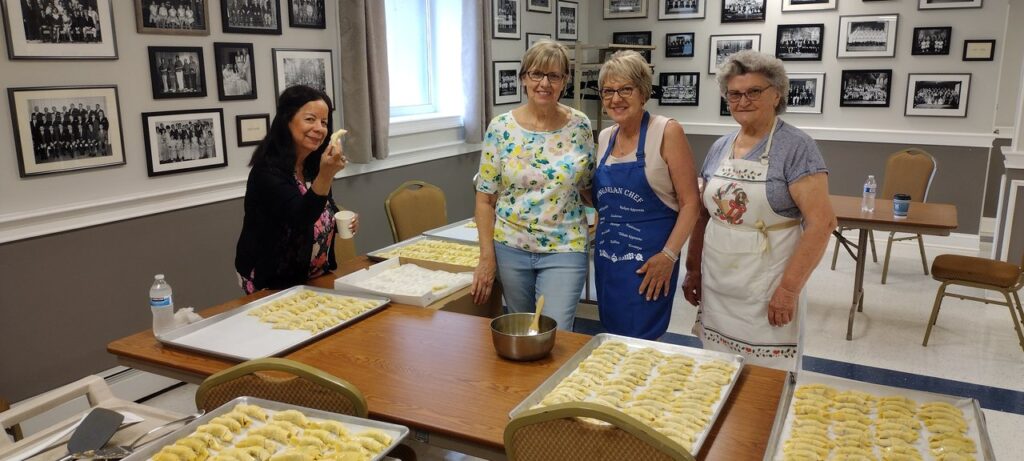
However, your website is only in English. Why?
We currently keep in touch with our community and mainly advertise our events on social media sites, in two languages. Members of our community, Ágnes Oláh and Margaret Pápai, who are librarian-archivists, recently took care of archiving our documentation, assisted by Gábor Szanyó and Viola Kovács, scholarship recipients of this year’s Kőrösi Csoma Sándor (KCSP) program, who also helped us a lot to identify the church members, to create statistics on who comes to us, how regularly and from what distance. Today, we also hold meetings in a mixed format, both in person and via video calls. After the Covid pandemic, we also faced the question of whether online services should be continued. Initially, we were afraid that it was keeping people at home and that they would lose a stronger connection to the church; at the same time, it turned out that for many of our members who moved away it was a way of maintaining contact with their old community: We see two to three hundred people following the Sunday Service broadcasts, in each language, which surprised us.
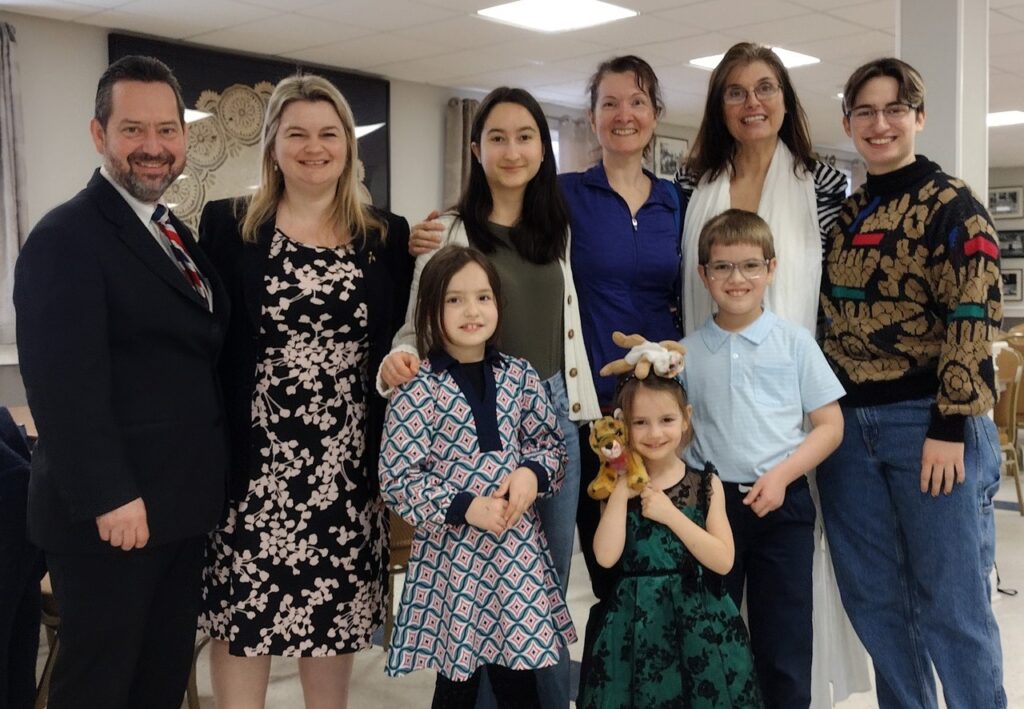
According to its website, the Hungarian Reformed Church in New Brunswick held its founding meeting on January 24, 1915, with 236 participants. By the fifteenth anniversary of its foundation, the number of members had almost reached nine hundred people. How big is the congregation today?
It’s difficult to determine the size of the congregation. The voting membership is currently between 100–120 people, on average 20–30 people attend the Hungarian and English services, but for example, at the last confirmation—which we hold every year or every two years with four to eight young people—we had over a hundred guests. At celebrations, such as most recently on Mother’s Day, we usually have a combined, bilingual service followed by joint lunches—there are also more of us. Then there are those who come to help, for the Hungarian Festival or for the regular cookouts intended especially for sale, but many of those attendees do not or rarely come to church service. And there are those on our mailing list who donate, think of the church but might not (or might not be able to) attend. Finally, we started to hear about people who have been reached by online worship, but we do not know them at all. Before the Covid pandemic, our attendance at Sunday service was higher, but that is typical of other churches as well, regardless of language or denomination.
Are there any signs of a return, a revival? What religious and other community programs do you have?
After Covid, we tried to organize programs that cannot be attended online, but it remains a challenge to attract larger numbers of our people on the weekends. Behind this is not only the pandemic, but the great challenge of every Hungarian community here, which is, on the other side, a blessing to our community: scout programs on Friday afternoons, Hungarian school on Saturday mornings, folk dance practices in the afternoon, and sometimes dinner at the Hungarian club on Saturday evenings. In this way, most people try to keep Sunday for their families. I’m having confirmation classes after the services, every other Sunday. My wife leads the Hungarian and English Sunday schools during church services—in Hungary, it’s more commonly called a children’s service. The latter is perhaps our biggest challenge: after many local Hungarian weekend children and family programs, only very committed parents bring their children to the church. Once a local Hungarian child was asked how many times he goes to school, and he answered: seven times a week: elementary school, Saturday Hungarian School, and Sunday School (in the church). On weekdays we mostly have preparation work for various fundraiser events, especially food sales, which is an old tradition—a social program and fellowship, an opportunity for the elders to meet, which is vital for them.
What about you, your background: how did you get here, how did you meet your wife? And what are your plans for the future?
I was born in Berettyóújfalu, Hungary. My father was also a Reformed pastor and due to his ministry, we sometimes moved, for example we lived also in Tiszacsege. After graduating from the Reformed theology seminary, I got a one-year scholarship to the Presbyterian Columbia Theological Seminary near Atlanta, in Decatur, Georgia after which I planned to return to Hungary. Since there was no Hungarian Reformed church in Atlanta, I did some research for further Hungarian Reformed contacts in the U.S. I found (online) a Hungarian Reformed church somewhere in Pennsylvania, called the pastor, who prepared a visit for me in Toronto, Canada, in a Hungarian Reformed congregation for two weeks as a guest student pastor. I was very touched by the intimate family atmosphere that welcomed me into that community. Upon leaving, the retiring pastor asked me to think about whether I would pursue a position in the congregation in Toronto. I started my ministry in the diaspora in that congregation, and after three years in Toronto, I continued my service in Columbus, Ohio. I didn’t plan to leave, but after five years, the need for a bilingual pastor was not that prevalent, while the previous Hungarian pastor, Very Rev. Barnabas Roczey in New Brunswick was preparing to retire, and I was approached to apply to be his successor. This is how I arrived here in December 2008. Two years later, I met my wife. We had our wedding in 2011, and today we have a ten-year-old son and two daughters, aged eight and five. In addition to educating children, Valéria is also involved in the church’s life. We feel at home, we plan to live here as long as God needs us in the local community.

